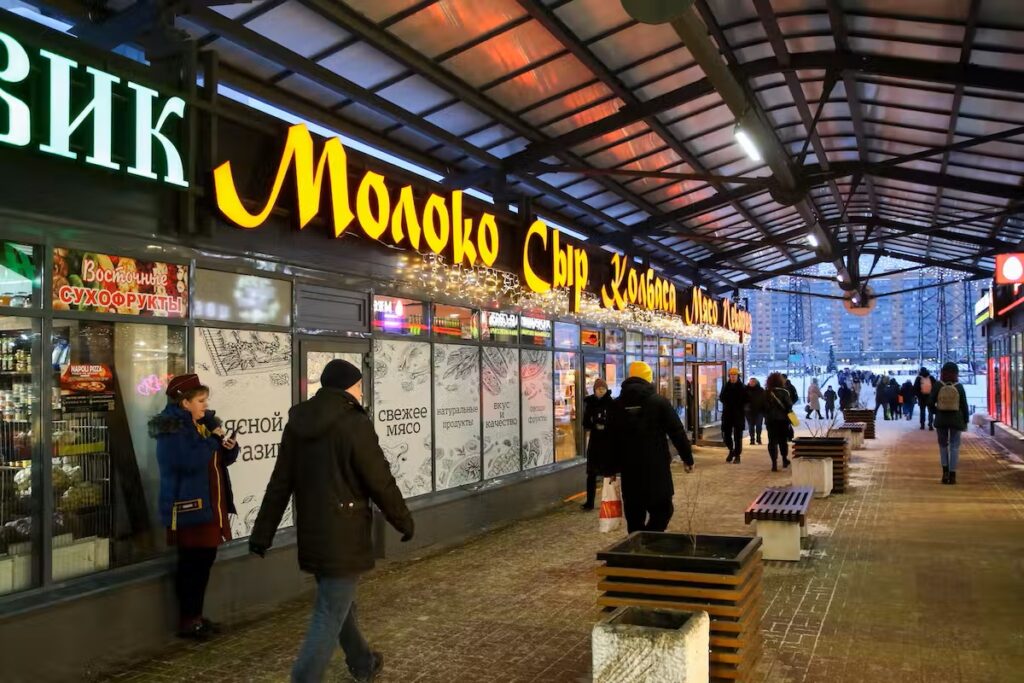Life On Russia’s Home Front After 10 Months Of Conflict
Jan 14, 2023 | Pratirodh Bureau
Life goes on: shoppers in Murino, a town near St Petersburg (Image: Maksim Konstantinov/SOPA Images/Sipa USA)
It’s been a year since I last visited Russia. Back then, most people I met thought the prospects of a war with Ukraine were very remote, despite the massive troops build-up on the border. So I was curious to see how attitudes had changed since then. Equally important was to see for myself how the war has changed life in Russia.
The first surprise was how normal life was. Despite all the media reports of doom and gloom as a result of western sanctions, everything works just as before. Domestic banking is working, salaries and pensions are paid on time, ubiquitous e-commerce is bustling with activity, the shops are stuffed with food and consumer goods. In St Petersburg, at least, I’ve struggled to notice any change in daily life compared to January 2021.
Yet, digging deeper and the impact of sanctions is there. One issue that kept popping up was spare car parts, which have become noticeably more expensive. But even there new supplies are being shipped now. This goes pretty much for everything else consumer orientated. There’s no shortages, even of western goods such as whisky – the supermarket shelves are fully stocked.
EU travel restrictions have had their effect – but nothing like the measures introduced during the COVID pandemic. People can still travel to many countries, including Turkey, Egypt or the Gulf states.
Business people complain of facing difficulties, particularly those in the import/export sector. But, after a few months of chaos, business has been finding new shipping routes via third countries such as Turkey or Kazakhstan.
An acquaintance who works in a defence-related sector laughed at the suggestion that Russia could run out of missiles. He told me the defence industry had been stockpiling essential parts for years and is also using more locally sourced alternatives (although this is a claim I was unable to verify). The rest can still be bought – albeit at inflated prices. Their real problem is not a lack of parts, but the capacity to scale up production to meet growing military orders.
The general impression from conversations with people in different businesses is that their main focus is on adapting to the new normal. Many things will be less efficient and more expensive, but the Russian economy will not collapse.
If this is a crisis for Russia – which it is – it’s nothing like the turmoil of the early 1990s when the state, society and economy were all collapsing at the same time.
Don’t Mention The War
Another surprising thing I’ve found is the extent to which the war is avoided on a day-to-day basis. You see reports about it on TV news and chat shows (which steadfastly follow the government line), but I felt much better informed about the war using the Telegram app in Belfast, where I live and work, than when talking to actual people in St Petersburg. I found you could have whole conversations without Ukraine ever coming up, unless I deliberately mentioned it.
My overall impression was that the invasion has reinforced people’s pre-existing views. Those who were always opposed to Putin hate it, while those who are supportive of the government remain largely in favour. But the vast majority tries to ignore it as much as they can.
No one I spoke to was happy that the war started – but there’s an important caveat: regretting it doesn’t mean they want to end it at all costs. Some said that one thing worse than a war is losing a war.
Nor did I see much evidence of popular protests. Obviously, many people who oppose Putin had fled the country already, especially since mobilisation began in September 2022. Many others opposing the war have been imprisoned. A couple of my friends (long-time critics of the regime) were planning to leave to avoid future mobilisation.
One of the most frequent questions I was asked related to the energy situation: “How much do you pay for gas in the UK?” The UK and the EU are presently suffering from high energy costs. But it’s unlikely the European economy will collapse or cause political unrest – the implicit assumption behind the question. It’s a similar situation in Russia. Despite western sanctions, it appears that there is little danger of Russia’s economy collapsing.
Perception Gap
My distinct impression from two weeks in St Petersburg is that Russia’s society and economy are still nowhere near to being fully mobilised for the war effort. While the partial mobilisation in September and October last year brought the war closer to home, it involved a relatively small percentage of the population – from all of my acquaintances only one friend of a friend was called up. Meanwhile further rounds of mobilisation are to an extent baked in to people’s expectations. Barring huge military setbacks leading to a really extensive mobilisation, it appears that life on Russia’s home front is carrying on fairly normally.
One of the biggest lessons from my trip is the huge gap between representations of Russia in the west and what you see when you arrive there. This gap in perception is likely to increase because of the lack of people currently travelling there from the west and the suspension of professional and academic links.
Important as they are, reliance on comment from anti-Putin activists in exile or those remaining in Russia and still active on social media won’t help as they’re marginalised at home and lose contact with Russian reality while abroad.
The fact is that there is no substitute for seeing things for yourself. I found my recent trip to Russia stressful – but I’m glad I did it.
(This article has been republished from The Conversation under a Creative Commons license. Read the original article)
